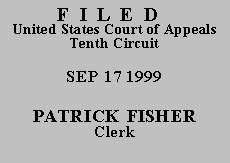

| UNITED STATES OF AMERICA,
Plaintiff-Appellee, Defendant-Appellant. |
No. 99-3013
(D.C. No. 95-20087-GTV) (Kansas) |
Robert W. Greenwood appeals pro se the denial of his motion for a writ of habeas corpus under 28 U.S.C. § 2255, in which he alleged that he was improperly charged under a federal statute for conduct unrelated to interstate commerce. We affirm.
Mr. Greenwood entered a guilty plea to possession of eighty-seven pounds of ephedrine with the intent to manufacture methamphetamine in violation of 21 U.S.C. § 841(d). On June 20, 1996, he was sentenced to a term of incarceration of 120 months. He did not directly appeal his conviction and it became final on June 30, 1996. On July 10, 1998, Mr. Greenwood filed his section 2255 motion for habeas corpus relief, arguing that the indictment was insufficient because it failed to include as a jurisdictional element a finding of interstate commerce, and that as a matter of fact, his conduct was limited to Kansas and had no nexus to interstate commerce. The district court denied the motion on its merits, but later, in response to Mr. Greenwood's motion to supplement and reconsider, the court revisited its earlier order and denied the motion as untimely under the one-year statute of limitations in the Antiterrorism and Effective Death Penalty Act, AEDPA. Mr. Greenwood appeals and we affirm.(1)
On appeal, Mr. Greenwood challenges the sufficiency of his indictment. "[T]he legal sufficiency of an indictment may be challenged at any time." United States v. Sullivan, 919 F.2d 1403, 1410 n.5 (10th Cir. 1991) (citations omitted). We review the sufficiency of an indictment de novo. See United States v. Dashney, 117 F.3d 1197, 1205 (10th Cir. 1997); United States v. Kunzman, 54 F.3d 1522, 1526 (10th Cir.1995). "An indictment is sufficient if it contains the elements of the offense and apprises the defendant of the charges he must meet." Kunzman, 54 F.3d at 1526.
In the instant case, Mr. Greenwood contends interstate commerce is an element that must be included in an indictment for a charge under section 841(d) and that the failure to include this element is a jurisdictional defect warranting a vacateur or a remand. We disagree. In United States v. Janus Ind., 48 F.3d 1548 (10th Cir. 1995), we expressly recognized that drug trafficking laws under 21 U.S.C. §§ 801 et. seq. require no interstate commerce element because these laws regulated a class of intrastate activities that per se affect interstate commerce. 48 F.3d at 1556 ("[I]ntrastate sales of drug paraphernalia are part of this properly regulated class" of activities which require no proof of a nexus between the activity and interstate commerce.).
We have also recently rejected an analogous argument with respect to 21 U.S.C. § 841(a)(1), see United States v. Wacker, 72 F.3d 1453, 1475 (10th Cir. 1995), and that holding is equally applicable to section 841(d). In Wacker, we distinguished United States v. Lopez, 514 U.S. 549, 560 (1995), which was decided after Janus, pointing out that "the conduct regulated by [section 841] clearly implicates interstate commerce, and Congress made explicit findings explaining the conduct's 'substantial and direct effect upon interstate commerce.'" Id. (quoting 21 U.S.C. § 801(3)-(6)).
Accordingly, Mr. Greenwood has failed to make "a substantial showing of the denial of a constitutional right." 28 U.S.C. S 2253(c)(2). For this reason, we deny a certificate of appealability and dismiss the appeal.
ENTERED FOR THE COURT
Stephanie K. Seymour
Chief Judge
*.This order and judgment is not binding precedent, except under the doctrines of law of the case, res judicata, or collateral estoppel. The court generally disfavors the citation of orders and judgments; nevertheless, an order
1. Because we resolve this appeal on the merits, we do not decide whether the provisions of AEDPA apply.